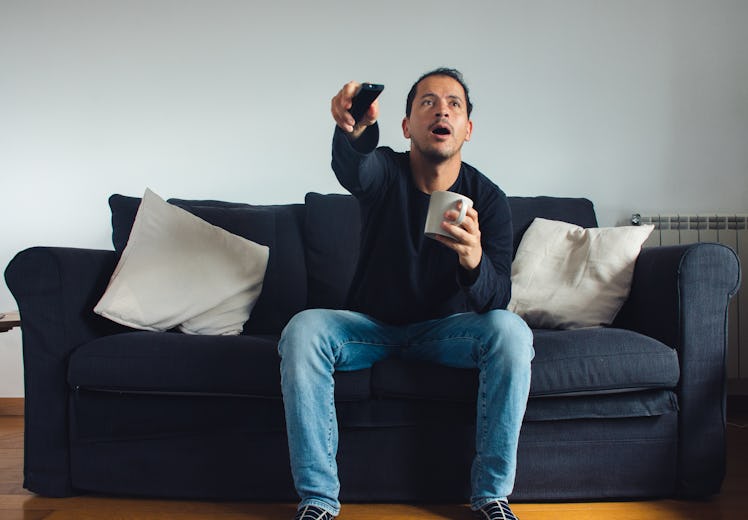What I Gained When I Gave Up Watching Sports
Professional sports had a pervasive control over my life. When I quit watching, I started paying attention to what was truly important.

It was fitting it started in March.
The madness. Whispers of school closures turned to formal proclamations. The cable news pundits swinging between hysteria and dismissiveness. Going to the grocery store turned into something out of a science-fiction movie: empty shelves, lines of people, deserted streets, and, of course, stripping down before entering the house as if our clothes carried the potential to turn our family into zombies.
And, of course, the NCAA basketball tournament was cancelled. Professional sports were put on hold. All bets were off.
The high flying athletes had been grounded, so we found ourselves filling the air with either Netflix or the news. Board games. Long walks. Discovering what heat does to food under our care.
For some of us, the loss of sports might have been the most insufferable part of it all — no on-court theatrics, no off-court dramatics. No cheerleaders, no cheering fans, no cheerful cries of victory. No highly paid cohort to flex their individual physical prowess in the name of our fair cities. A prominent part of our collective identities had been taken from us, indefinitely, seemingly overnight.
And that’s how my eyes opened to the pervasive control sports had over my life.
Not that sports in themselves are bad of course.
I mean, I’d only indulge while cooking, or after dinner while washing dishes, or while trying to do work. Sure, maybe I’d steal some peeks while doing bedtime with my kids, or while sitting on the couch with my wife when we finally had some alone time, or while playing in the yard with my kids. Who could blame me: it was all around us and everyone else was doing it.
I told myself there was nothing wrong with setting fantasy football line-ups in church, or checking on sports while on the clock, or being emotionally effected by the outcomes of sporting events, or losing sleep to watch my favorite teams. Having people I’d never met, and whose performance didn’t directly impact me, cause mood swings and sleep deprivation is totally normal and acceptable, right?
Right?
And so, for that first spring of the pandemic, a little part of me couldn’t settle. I was constantly agitated. Those first couple of weeks, I would refresh ESPN obsessively. I’d watch sports documentaries and movies. I’d even watch old highlights on Youtube. But live sports weren’t coming back soon, and honestly, that’s what I really wanted.
I had to take the loss and move on.
And yet, in the first spring of a pandemic, I slept better than I had in a while, even with a newborn. I worked out more, ate better, and saw the brilliance of my 3-turning-4 year old daughter. I actually paid attention when my wife was talking to me. She’s delightful, too, by the way.
And I was happier. Consistently. Without the mood swings based on my favorite team winning or losing. Without the bouts of annoyance when life drew my attention away from my favorite pastime.
I was happy because life, my life, was it. Sans diversion. Stripped down to the basics.
It struck me first when I was in the backyard with my daughter playing hot lava. We hopped from chalk-drawn rock to chalk-drawn boulder to chalk-drawn fallen-tree, trying not to fall in the volcanic flow around us. My mind was clear, my attention only on her—her laughter, her imagination, the coolness of the shade, and the light illuminating the poorly etched rocks we had worked together to create.
It was a Saturday, late in March. The tournament would have likely been in the final stages. I would have been inside, on the tablet, compulsively sipping a beer and munching on something between cardboard and pure sugar. And my daughter would have been alone. Or looking at me, begging me to go outside with her.
And I would have said, “Tomorrow, later, I promise.” And I likely wouldn’t have kept that promise for long, if at all. My identity as a father would have been benched for my identity as a fan. I would have probably continued living a life poorly lived, with my relationships suffering as a result. And I would have been none the wiser, blind to it all.
Because it was almost Opening Day. And the Masters. And the draft. And the Stanley Cup. And the NBA Finals. And the Olympics. And NCAA football. And NFL football. And—
Sports are coming back, little by little. Where it is inevitable we will once again follow sports, teams, players, may we take this opportunity to balance our fandom with our families, weighing the attention we give to athletics with other aspects of our lives.
The pandemic showed me the ultimate things in my life, and ultimately, being a fan of sports isn’t, and shouldn’t, be one of them.
This article was originally published on